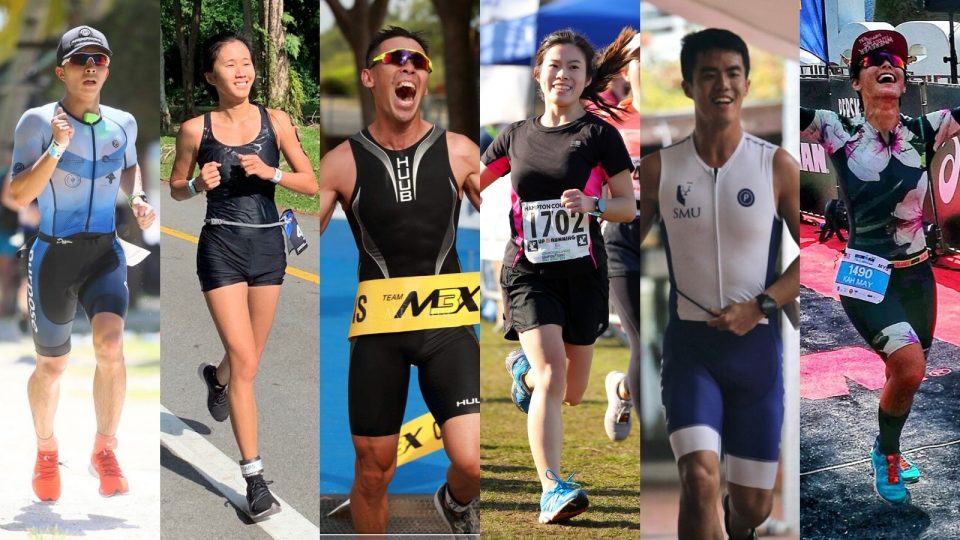Are three sports in one too challenging for you? How about trying out two sports instead?
Aquathlon makes it perfect for people who love running and swimming.
To understand more about Aquathlon, we are privileged to speak to six dedicated Aquathletes to find out their ups and downs and their experience with this sport.
Besides that, they will be sharing their tips and tricks on how to perform better at Aquathlon as well.
What is Aquathlon?
Aquathlon is run – swim – run race. However, it is not uncommon to see a two-stage race that is essentially a swim and run mix.
Aquathlon can take place on a trail, a road or a route. This depends on what the course is asking for and where it is based. Likewise, swimming can take place in any places, such as swimming pool, lake, ocean and etc.
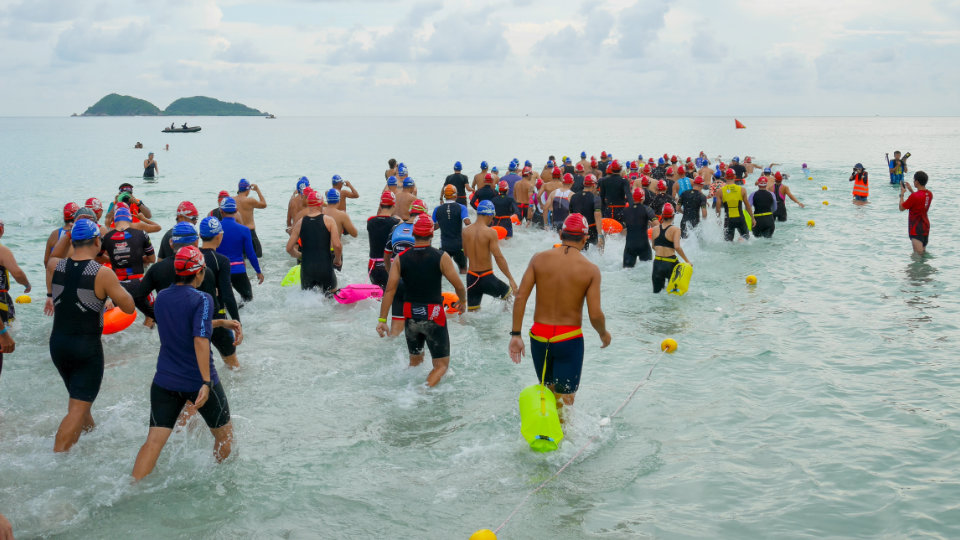
How do Aquathlon works?
Normally an Aquathlon race varies based on distance, some of the distance format used are Olympic-1 mile swim and 6.2 mile run, Half Ironman-1.2 mile swim and 13.1 mile run, and Ironman-2.4 mile swim and 26.2 mile run.
There are also few local time-based competitions where athletes swim for a fixed time (10 or 20 minutes) and then run for a fixed time (30 or 45 minutes).
What to wear for Aquathlon?
For Aquathlon clothing, you will need to prepare a tri-suit or swimsuit. But tri-suit is the one athlete wear the most for Triathlon and Aquathlon.
Goggles and swim cap also is essential during your race in the ocean or pool and once you are up on the surface. Some athlete might wear a shirt to continue their race.
How to train for Aquathlon?
To prepare for an Aquathlon, you will need to plan on how you will approach your action during training. Here are the few steps to train for an Aquathlon.
Step 1: Research
Take the time to read the race info kit, which include the time of registration, the time transition area closes, waves, and start times. Get familiar with the multi sport terms. Do research on what to wear, what to eat, how to train, and what to expect.
Step 2: Practise
During the race, the transitions can make or break your performance and momentum. So usually, races will swim and run in the same clothes, which is in a comfortable tri-suits, for efficiency in both the swim and run sections.
Tri-suits is a regular sport swimsuit, and a functional swimwear. Besides that, you will need the with the basic gears for running and swimming, such as goggles, a swim cap, and running shoes. It is recommended to put your gear starting with your feet and working up to the head. Also, place what you will wear first at the top and the last at the bottom.
Step 3: Race day
During your race day, you would want to avoid any injury during your run. So, your arm actions should be symmetrical, your hands have to be relaxed, and always listen to your body. It is best to commit with the same swimming stroke you are comfortable and more confident with during your swim race.
Be prepared to be hit and kicked during the race proper, but do not take it personally. As everyone is trying to get ahead, so it’s better to exercise caution and learn to swim with your head up, for 2 or 3 strokes to be able to see your path.
Step 4: Enjoy your Aquathlon race
Remember to rehydrate after your race, so that you can replenish the minerals and electrolytes you had lost. Drink sips of water instead of a mouthful of water to get the maximum effect.
Sometimes, it can be tempting to stop and sit down after you cross the finish line of the race. So, it is better to stretch and walk or jog around to lower your heart rate and to stave off the stiffness.
Eat just enough to recover. Just because you did an Aquathlon, that does not mean you can eat everything you want for your celebration. For your post-race meal, make sure you did have a good mixture of carbohydrates, protein and healthy fat. Last but not least, take an early night to recover from your training and the race itself because you deserve it!
What to prepare for an Aquathlon race
Pack light and small
It is important to pack a light bag for your race as you do not want to bring a bunch of things for your race. Normally, during the race the transition is short.
It is recommended to bring a bright coloured towel or a recognisable gears that you are bringing on that day. So, you might not get confused on which is yours afterwards.
Early arrival
It is best to arrive early, which is approximately 60 – 90 minutes before your wave flag off. Before that, you will realise that you will need the time to set up your transition, body marking and warm-up as well. So, better be earlier than late.
Clean goggles
Make sure to have a small bottle of water to rinse your goggles before you start your swim. This is because it might get foggy after your swim. So, you can do a quick rinse when you are in the start pen, and leave the bottle by the side before you move off.
Aquathlon vs Duathlon
Aquathlon eliminates your bike costs
Duathlon required a bike, which is costly. Whereas Aquathlon do not need to invest any pricey gear for the race. So, eliminate the cost of bikes is a major budget saving in your bank account.
You will have to pay for your bike maintenance such as cycling apparel, helmets and shoes. If you do not have these investment, you could apply them in Aquathlon entry fees or hiring a coach to train you.
You do not have to worry a flat tire
It is a hassle when your tires run flat during your Duathlon race, But for Aquathlon race, you do not have to worry about that. Just grab your goggles, throw on a pair of running shoes and you are good to go.
Why try Aquathlon?
Aquathlon eliminates sore rear ends
Yes, it is true that Aquathlon reduce your risk of head trauma. In your mind, you might be afraid of sharks, but there is a very slim possibility that they may attack you. Open water swimming and running results in fewer head injuries than cycling.
Manageable and focus training
Aquathlon just requires and focus on two sports instead of three, which are swimming and running. With this, you can perform faster in each one still reaping the benefits of cross-training.
Vanessa Lok
Bio: 21 year-old, Full time student
Vans never did running, cycling and swimming as a sport before. Her main sports are tennis and volleyball. Vans started her running journey in July 2018, then started multi sports in March 2019.
Just do it! Life’s too short to hesitate. So, try and sign up an Aquathlon for your first step.
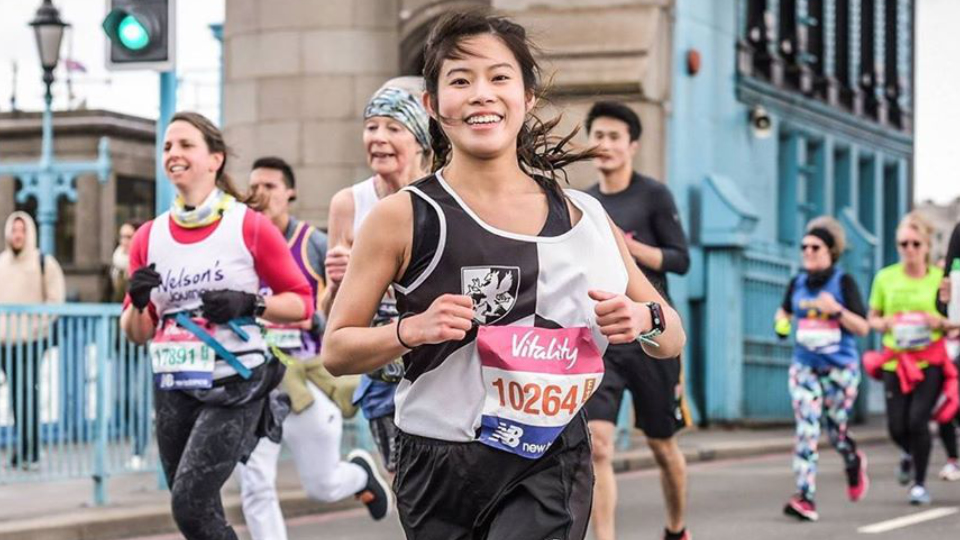
RS: Why would you choose to do Aquathlon instead of triathlon?
Vanessa: To be honest, I never thought about doing a Triathlon when I trained for my first Aquathlon. My primary sport has always been running, but at the same time I have always loved challenges, and that’s when I first ventured into a multi-sport world.
Having completed a half IRONMAN and a couple of Aquathlon, I would say they are very different. Aquathlon and triathlon both offer their own challenges and techniques, neither is “easier” if you are looking to go into a multi-sport discipline.
The reasons I could think of as why people choose to complete an Aquathlon as they are a beginner in multi-sport or simply they dislike cycling or prefer the flexibility to complete a variety of Aquathlon abroad.
RS: When do you have the passion to do Aquathlon?
Vanessa: My passion began when I was nine months into running last year and I was really proud with how far I came, by that time I had done three half marathons and many cross country races.
I was hungry to move on to another challenge and started to look into multi-sport, the ease of transport and easy equipment preparation, then sparked my interest in Aquathlon, and I’d personally say it is harder than triathlon of the same distance.
The breathing technique and fast recovery are vital in completing your fast Aquathlon time, and if you are like me, you really enjoy the pain it brings you in running.
RS: Can you share with us your Aquathlon training plan?
Vanessa: You need to remember that whenever you create a training plan, make sure it is tailored to yourself and that you stick to it.
Training plans can be as simple as it can be, how I trained for my last Aquathlon, where I got my personal best, was as simple as 2x run, 2x bike and 2x swim during the week. Don’t underestimate the benefits of cross training and stretches!
RS: What is the one thing you dislike during the training for Aquathlon?
Vanessa: I’ve always found swimming in a pool boring, so that was the least interesting part of the training plan, especially during a weekend when the pool is packed, which makes it harder to train!
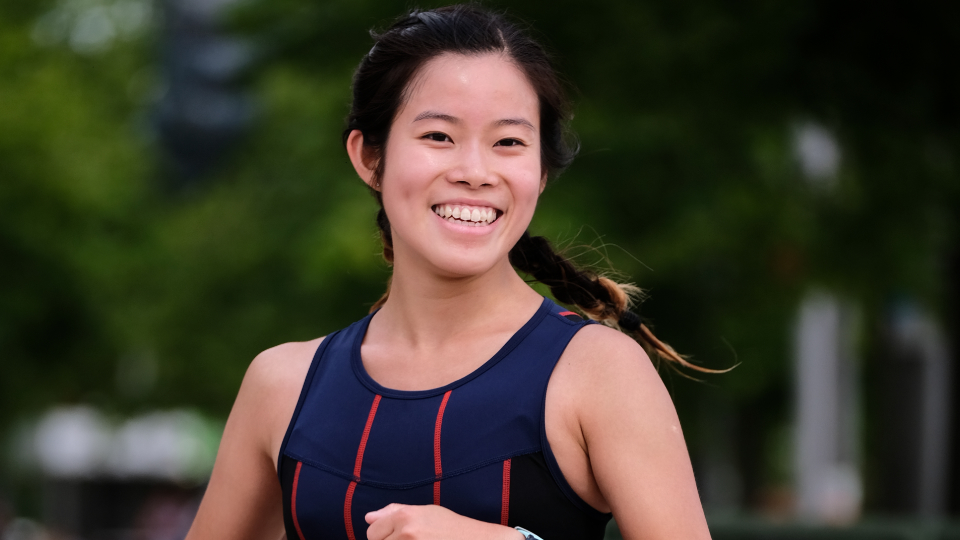
RS: What are the useful techniques you pick up that help you to improve your competition in Aquathlon?
Vanessa: Good nutrition and good sleep a week before race day, race with a friend if you can, watch videos how to best lay out your transition area, research what the race venue is like (25m or 50m pool/ heated or lido pool), invest in a race belt, tri-suit and tri-shoe laces, and stay hydrated before the race starts!
RS: What did you enjoy the most throughout your Aquathlon journey?
Vanessa: I enjoy most during my Aquathlon journey is meeting people who have just started doing multi sports. It’s a great community out there to support each other.
I’ve met a very close training buddy of mine at the first Aquathlon race I did, we still keep in touch and train together now, it’s unbelievable! Secondly, I love spicing up my training and rest days with different endurance and strengthening exercises, such as gym classes, indoor bike and yoga.
RS: What advice you could give to beginners if they just started Aquathlon?
Vanessa: Just do it! Life’s too short to hesitate. Running alone has changed my life, can you imagine how multi-sports changed me even more?
Try and sign up an Aquathlon in a pool first before venturing out to open water and bring a towel to keep yourself warm before swimming.
You can follow Vanessa on Instagram: vans.on.the.run
Ng Wei Quan
2. Bio: Ng Wei Quan, Singaporean, 23 year-old, Student Financial Advisor
Wei Quan started off as a pure runner and started training seriously only after his military days. Then, Wei Quan joined Trackstar Athletics under Coach Elangovan to ensure that he has a structured programme.
In his first year in university, Wei Quan joined SMU Aquathlon, which is a club whereby they do Aquathlon races locally. Sometimes, a few of them will take part in Duathlon and triathlon races as well.
In the year of 2019, it was his breakthrough year, whereby Wei Quan was blessed to be able to race against the top Duathletes in Singapore to fight for a slot in the SEA Games, and also was fortunate to represent Singapore at the ITU World Cup Long Distance Triathlon in Wenzhou as an elite athlete.
Recently, he won the 70.3 Half Ironman Triathlon for his age group in Langkawi, and earned a slot in the Half Ironman World Championship 2020 in Taupo.
Take a leap of faith, because when you cross the finish line, you’ll be very satisfied!
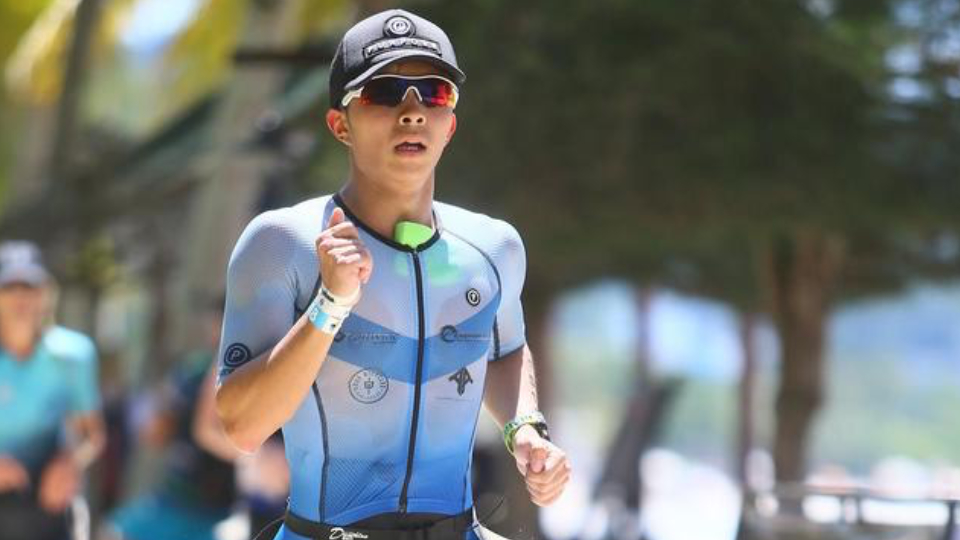
RS: Why would you choose to do Aquathlon instead of Triathlon?
Wei Quan: Aquathlon is an easier sport to pick up, because of the lower cost needed in Singapore. Triathlon has a Cycling leg and it requires a huge start up cost for buying a road bike.
Hence, I decided to start off trying out endurance sport through my first Aquathlon race, because all I need to have is just a pair of goggles, a pair of shoes and a strong grit of determination!
RS: When do you develop the passion in Aquathlon?
Wei Quan: I started Aquathlon after my military days because I wanted to learn how to swim properly. Although I did not learn how to swim properly in my young days, I felt that the sport is about hard work and patience.
RS: Can you share with us your Aquathlon training plan?
Wei Quan: I swim about 3-4 times a week. Usually, there will be easy swims, technique swims, tempo swims with a swim squad and also open water swim sessions on weekends!
My runs are also done in mostly 4 sessions. These sessions include an easy run, an interval run session, tempo runs and also long runs to increase my aerobic fitness.
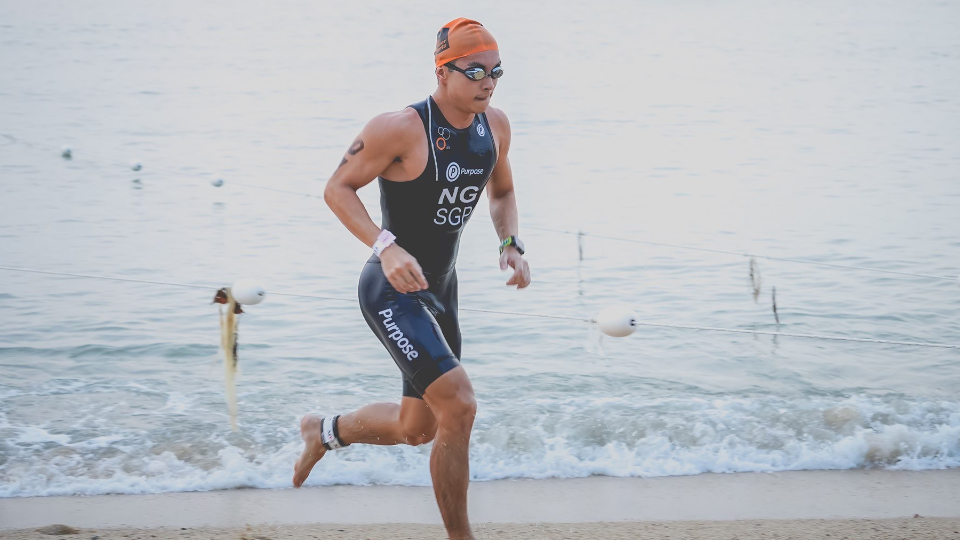
RS: What is the one thing you dislike during the training for Aquathlon?
Wei Quan: I did not have any swimming background, and it is hard to always be lacking behind during swim suits! It is hard to get the strokes right at the beginning and I would always wonder how did people swim so smoothly.
RS: What are the useful techniques you pick up that help you to improve your competition in Aquathlon?
Wei Quan: I think focusing more on swimming technique and how to feel relaxed helps a lot in Swimming. Also, doing more core exercises helps because when we activate our core during the swim, we become more stable. When we activate our core during the run, we are able to run in a firm position.
RS: What did you enjoy the most throughout your Aquathlon journey?
Wei Quan: It is the process of progression, whereby I could see improvements in my swim/run timings. Even transition timings are also positive things that we can take away! More importantly, to see the community grow is what makes my journey the most worthwhile.
RS: What advice would you give to beginners if they just started Aquathlon?
Wei Quan: Try out the sport. Everyone will have to start somewhere, somehow. So, take a leap of faith, because when you cross the finish line, you’ll be very satisfied!
You can follow Wei Quan on Instagram: @weiquanng
Lee Kah May
Bio: 30 year-old Malaysian, Forensic Investigator
Kah May has always grown up around sports as a kid, and was formerly a state swimmer for Selangor and KL, but stopped training competitively in Form 4 to focus on SPM exams.
Ever since then, sports have taken back seat in life. About 5 years ago, she found like-minded friends who gave her the push to jump into the world of multi sport, and the rest is history.
Now, Kah May is your average age-grouper and weekend warrior, always looking for the next race to sign up for.
Take your time to build up your water confidence, and you can tackle any sea that comes your way!
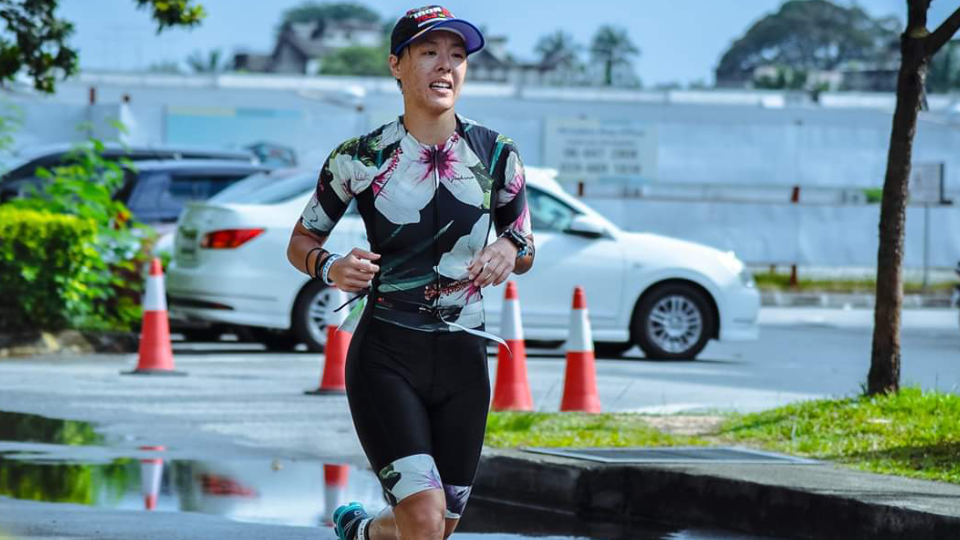
RS: Why would you choose to do Aquathlon instead of Triathlon?
Kah May: Because that’s one less discipline to train for! Jokes aside, the Aquathlon adds to the repertoire of multi sport racing and is still very much as intense as a triathlon.
It brings a nice mix into one’s standard training regime/ race calendar of swim-bike-run. An Aquathlon is also a great way to start for first timers who want to dive into the world of multi sport, if they have not yet picked up cycling. All you need is yourself!
RS: When do you find the passion in Aquathlon?
Kah May: I was always a little lazy and lacked the discipline to push myself beyond limits, but I always found myself in awe of endurance athletes – like how they are able to keep going so hard for so far, and so long!
When I picked up these sports again as an adult, I wanted to explore all the various forms of multi sport races there were out there and to challenge myself to see if I could also build up that endurance and stamina I neglected all the while.
Years on now, I have to say the passion to continue Aquathlon and everything else stems from the adrenaline rush I get when racing. Or maybe that’s my competitive streak in me speaking.
RS: Can you share with us your Aquathlon training plan?
Kah May: Well, the goal has always been to train daily. But realistically, depending on my work schedule, I try my best to get in at least 3 single discipline sessions (run/ indoor cycling/ strength & conditioning/ swim) during the weekdays, and the weekends for a long ride and long run. I throw in brick sessions when nearing race season only.
When I had a bit more time on my hands, I used to join a team to train with (GoGetter Triathlon Squad or the Swim Smooth/ MySwim group swim sessions) to boost my training. I personally get extra motivated when surrounded and training with friends. Group training doesn’t work for all, but if it does, it throws in a nice feel of healthy competition to push you to the next level.
Lastly, the most important in my training plan is to incorporate lots of rest and recovery. And I mean, lots of it. Sleep is King!
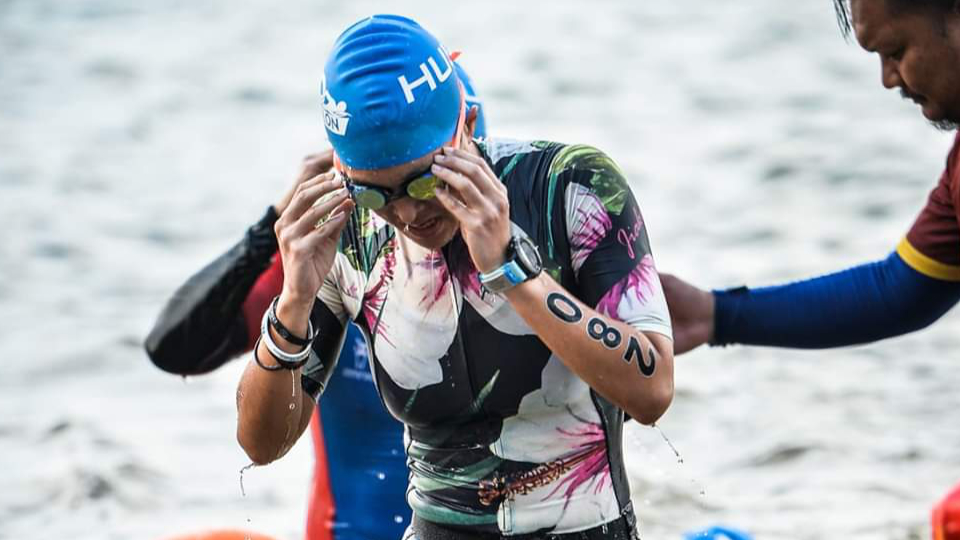
RS: What is the one thing you dislike during the training for Aquathlon?
Kah May: The brick sessions. Not only for the reason that sometimes logistically, it’s not that easy to find a space to run or have the treadmill right where you need it. But bricks are painful!
RS: What are the useful techniques you pick up that help you to improve your competition in Aquathlon?
Kah May: Most Aquathletes are in open water, rarely a swimming pool. So even for me coming to swim experience, I had to pick up open water swimming techniques to help me tackle the sea (and other athletes around). Seek out a coach to help you improve your swim or run technique.
RS: What do you enjoy the most throughout your Aquathlon journey?
Kah May: Definitely, the camaraderie from this sweat life. I am thankful for all the supportive friends I’ve made throughout this journey, and for the ones who still stick through till today.
RS: What advice would you give to beginners if they just started Aquathlon?
Kah May: Firstly, kudos to the beginners for taking the first step to train and sign up for an Aquathlon race. Training is a long and tedious process, takes a lot of patience to see results, so don’t rush the process (it’s not worth the stress!).
Take your time to build up your water confidence, and you can tackle any sea that comes your way. This is going to be a life changing journey, so enjoy it to the very fullest!
You can follow Kah May on Instagram: @kahmayzing
Leong Jian Wei, Nicholas
Bio: 22 year-old Singaporean, Student
Currently, Jian Wei is a Year 2 undergraduate at Singapore Management University (SMU) and pursuing a bachelor’s degree in Business Management. Jian Wei’s hobbies include reading, listening extensively to music and trying out new sports.
Prior to trying out Aquathlon since Aug 2018, he was slightly involved in Water sports such as Sailing, Canoeing and Water polo, but he was never an avid runner.
Nonetheless, joining Aquathlon has been one of Jian Wei best decisions to date in university, because of how it has improved his fitness tremendously. The numerous friends he has made here on top of the many other delights such as breaking new PB timings and completing races has made his decision more worthwhile.
Aquathlon might seem daunting and there is no doubt going to be a couple of down times and discouraging moments within this sport, but never give up because you will definitely improve.

RS: Why would you choose to do Aquathlon instead of Triathlon?
Nicholas: Personally, I feel that both Triathlon and Aquathlon are equally challenging, yet extremely fulfilling. I guess someone might choose to attempt an Aquathlon over a Triathlon probably because it might seem more beginner friendly given the fact it is two sports instead of three.
RS: When do you have the passion to do Aquathlon?
Nicholas: My passion to do Aquathlon honestly was kindled after joining the SMU Aquathlon. To give some background, I joined Aquathlon after being persuaded by a senior who was in the club and wanted to treat it as something recreational initially.
However, after attending a few trainings, I came to love the culture in the club and how encouraging everyone is and also, what a close knitted community that this club offers. Although Aquathlon is an individual sport, SMU Aquathlon taught me so much and showed me the beauty of how this individual sport can be done together as a team.
Be it training together or cheering each other on during races, these are the small things that kindled this passion to do Aquathlon within me and spur me on to continually improve myself during both races and training.
RS: Can you share with us your Aquathlon training plan?
Nicholas: On a weekly basis, I would be training minimally three times with the club. Swim sessions on Monday, run sessions on Thursday and Brick sessions on Saturday. (Brick trainings are made up of both swimming in the open waters and running).
What we are doing during each training depends on the training regime that our coach plans, so it can be either endurance trainings (longer distance) or speed trainings (shorter distances). Besides these trainings with the club, I would try to do my own training at least twice a week and this includes strength workout at the gym or really long swims.
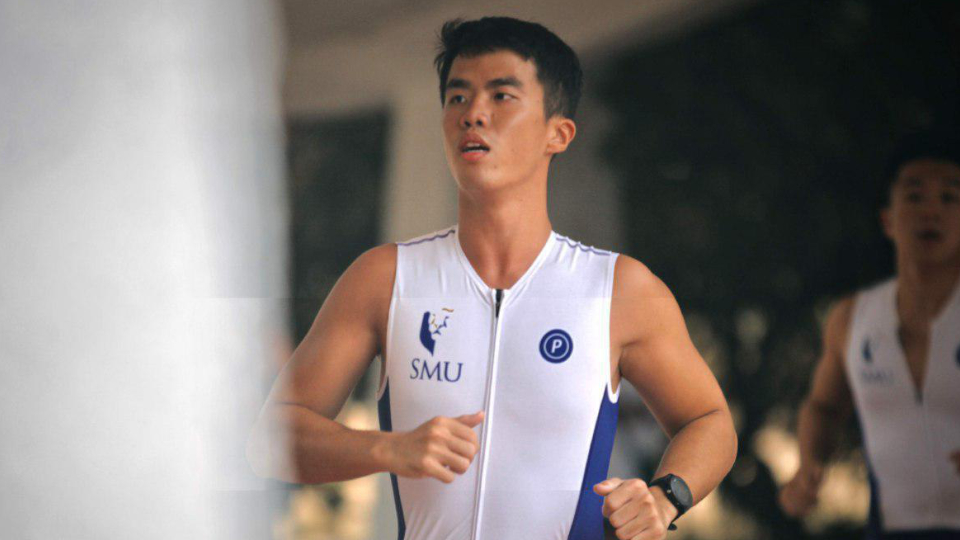
RS: What is the one thing you dislike during the training for Aquathlon?
Nicholas: I would not really say dislike, but one thing that is definitely dreadful is how demanding this sport is in terms of time put into training, especially when you have to juggle with numerous other things such as academics and social life. However, I would like to see it as a challenge, as to how well I can manage my time and make the best out of it.
RS: What are the useful techniques you pick up that help you to improve your competition in Aquathlon?
Nicholas: Definitely learning and understanding what are the correct swim strokes and appropriate running strides from my seniors and coach. These techniques definitely helped me a lot through both competitions and trainings. Some of these techniques include running on the ‘ball’ on your feet or even mastering the ‘high elbow catch’ when swimming. These techniques really help a lot, especially for beginners, who are new to both swimming and running.
RS: What do you enjoy the most throughout your Aquathlon journey?
Nicholas: It would be the friends that I have made along the way. While hitting new PBs and completing races are definitely enjoyable. I guess the thing that I would enjoy the most is spending time with the club and the members.
It is never a dull time with them and collectively, all of them have taught me so much. Be it technical skills or even just motivating one another through trainings or just studying together, I am really very thankful to have joined this club in university and they are definitely the most enjoyable part of my Aquathlon journey.
RS: What advice would you give to beginners if they just started Aquathlon?
Nicholas: Don’t be afraid to try it out. Aquathlon might seem daunting initially and there is no doubt going to be a couple of down times and discouraging moments within this sport, but never give up because you will definitely improve a lot eventually.
It is ideal if you can start it off together with someone or a group so that all of you can continuously motivate each other through all the trainings etc.
You can follow Nicholas on Instagram: @nicholasnljw
Lee Hui Xin
Bio: 23 year-old Singaporean, Student
Before entering into university Anne signed on to the Singapore Army for a few months. But due to an ACL injury, she could not continue with her service.
During Anne’s first year at University, she joined SMU Aquathlon, but did not attend much of their run training as she had her ACL surgery in the early October 2017. It took Anne roughly a year to get back to her full potential and had to put in a lot of time and effort to build up her muscle and basic stamina.
Currently, after her second year, Anne first joined SMU Aquathlon and now her body condition is better and stronger than before.
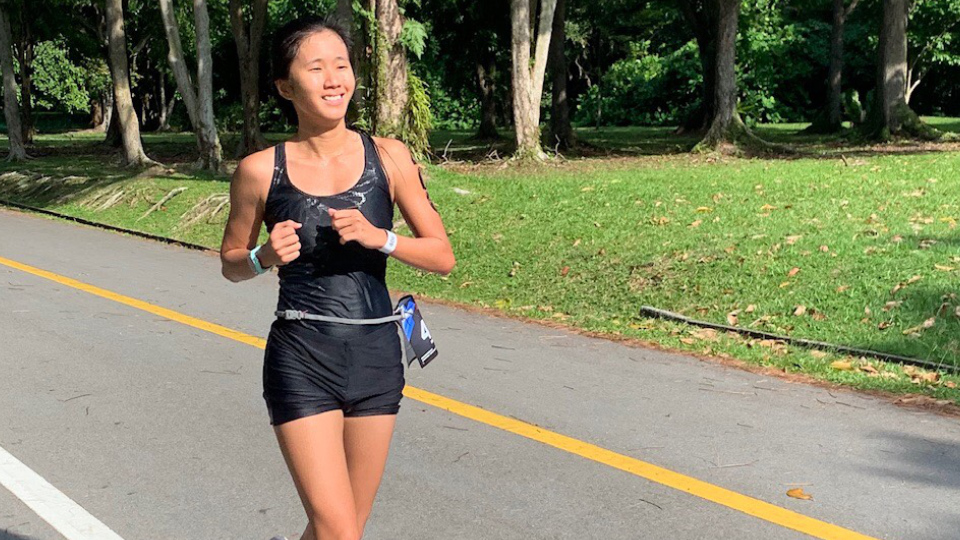
RS: Why would you choose to do Aquathlon instead of Triathlon?
Anne: When I first started there wasn’t really a choice to go triathlon as SMU only has a club called Aquathlon. The reason why I joined Aquathlon was because of the people. Despite being an individual sport, we trained as a team.
RS: When do you have the passion in Aquathlon?
Anne: My passion in Aquathlon was mainly driven by the motivation to bring my team to a greater height. Within the University there is a race called the Inter-university Competition, where they take the total time on each university’s top 3 (women) or 5 (men) member’s timing and the team with the fastest time wins.
This competition is mainly my drive for training hard, knowing that all member’s timer counts and being one of the core members, all the more I had to put in the effort the training and not let my team members down.
RS: Can you share with us your Aquathlon training plan?
Anne: Normally, when training for a race I would train at least 4 times a day. To cover both swim and run trainings and getting my body used to it.
- Monday: Swim
This session is dependant on what my coach brings. - Tuesday: Tempo runs / interval
Tempo run: clocking a certain distance, e.g. 8km and maintaining the pace. Throughout.
Interval run: 1km sprints max sets from 5 to 10 sets. - Thursday: Sprints session
This session is dependant on what my coach brings. But it includes mainly of sprints and occasionally hurdles and skipping ropes. - Saturday: Brick (open water swim and run)
- Sunday: Long run (occasionally)
When there is no race, the training would cut down to twice or thrice a week.
- Monday: Swim
- Thursday: Sprints session
- Saturday: Brick (open water swim and run)
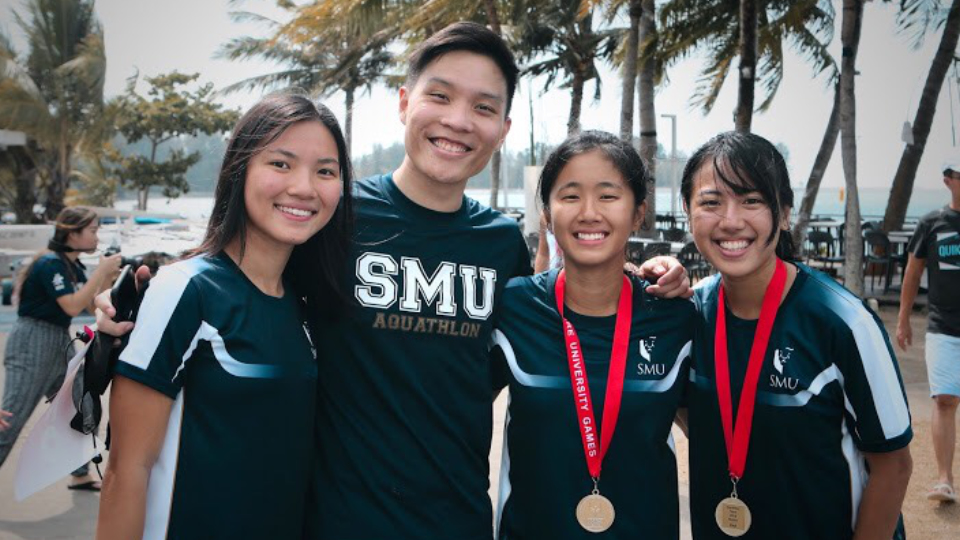
RS: What is the one thing you dislike during the training for Aquathlon?
Anne: I dislike the most during training for Aquathlon was when I was preparing for a race, I often faced injury issues such as muscle knots or other issues arising from the training. If not handled properly, I was not able to perform my 100% during the race.
RS: What are the useful techniques you pick up that help you to improve your competition in Aquathlon?
Anne: Some useful tips:
- Stretch regularly, always stretch after training. There are a lot of benefits of stretching such as preventing injury, preventing muscle tears and etc.
- Consume lots of carbs and protein after a hard training session. It is essential that we consume enough food for our body to recover. (Fun fact: carbs actually helps the body to recover faster than protein)
- Visit a sports massage 3 – 4 weeks before your race. Usually around that period, due to pre-race jitters I tend to overtrain, which results in injury. Hence, I would visit the sports massage to relieve the muscle stress and knots.
RS: What do you enjoy the most throughout your Aquathlon journey?
Anne: Throughout my journey, training with people I love was the best and the worst. When training was tough that I wanted to give up, there will always be someone there to encourage and to push me. I know that if I were to train alone, I won’t be able to do it. Hence, I am really thankful for the team that’s training together with me.
RS: What advice would you give to beginners if they just started Aquathlon?
Anne: Some advice to beginners is that in beginning, it’s not going to be easy. You are going to constantly question yourself. Telling yourself, you made the wrong choice and that you are crazy.
Despite all those negative thoughts know that these mindsets are momentary. Overcoming these thoughts will definitely make you stronger and soon enough, you will start to enjoy it. Enjoying it is an understatement. Soon enough when you are feeling stressed, upset or anything, it will be your best remedy and recovery.
You can follow Anne on Instagram: @annneeeleee
Aldrian Yeo Yu Yong
Bio: 36 year-old Malaysian, Triathlon Coach
Aldrian started as a competitive swimmer and he fell in love with Triathlon in 1999.
Aldrian is also a full-time Triathlon coach and event organiser. He is married to fellow triathlete, Serena Yang and blessed with one cheeky baby, Trevor.
Aldrian represented Malaysia in Asian Games 2018. This coming November and he is going to represent Malaysia in SEA Games 2019 as well.
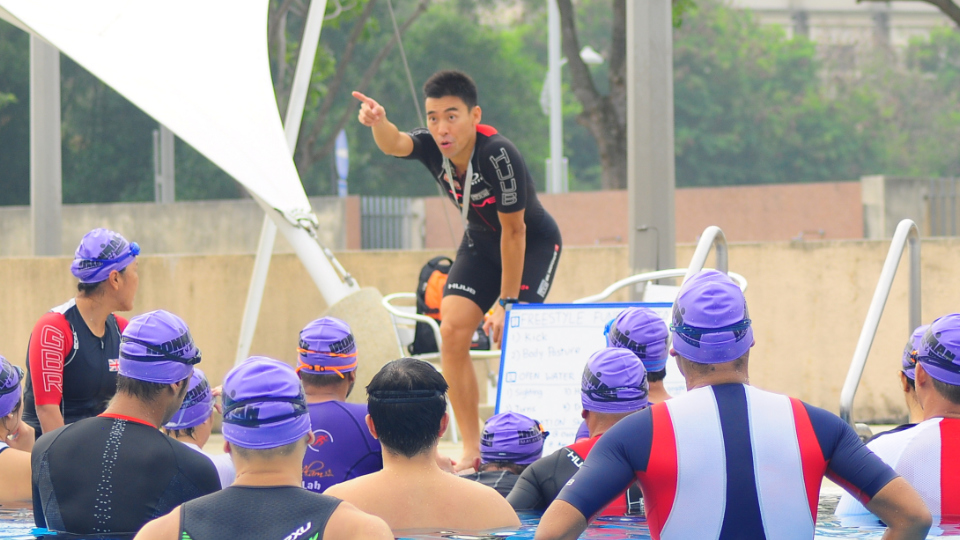
RS: Why would you choose to do Aquathlon instead of Triathlon?
Aldrian: I do find Aquathlon a lot more fun, without the bike portion it makes race day less hassle and safer e.g. no bad luck such as nasty crashes, tyre punctures or mechanical problems. But an Aquathlon is still equally intensive and exhausting.
RS: When do you have the passion in Aquathlon?
Aldrian: Can’t remember when or where was my first triathlon. But swimming is my forte, I enjoy this advantage when competing.
RS: Can you share on how you train for your Aquathlon?
Aldrian: As I trained primary for a triathlon, I get adequate swim and run training in a week or leading up to an Aquathlon race. The only training I would do to prepare better for an Aquathlon is swim + run combination session. A hard swim followed immediately by a fast run, these trains my body to adapt quickly to the changes.
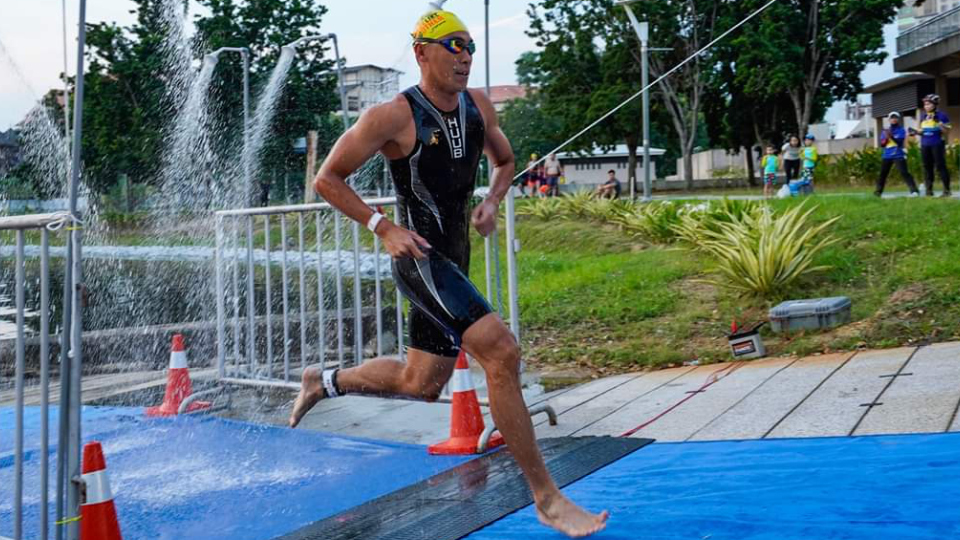
RS: What is the one thing you dislike during the training for Aquathlon?
Aldrian: Nothing. Love everything about it.
RS: What are the useful techniques you pick up that help you to improve your competition in Aquathlon?
Aldrian: Practice sighting in water during training & sight more frequent on race day – Many athletes don’t sight enough during the swim causing them to drift or goes zig-zag, wasting time and swimming more distance.
RS: What do you enjoy the most throughout your Aquathlon journey?
Aldrian: The community or people in the sport. You can feel the energy, positivity, friendliness between the participants, which creates a very encouraging feeling.
RS: What advice would you give to beginners if they just started Aquathlon?
Aldrian: First, do not underestimate the open water swim, ensure you are able to cover twice the distance you are competing in the pool without issue before you decide to sign up or participate. For example, if you sign up for a race that involves 750m swim, test out and make sure you can swim non-stop in a pool twice the distance (1500m) without problem.
Second, open water can be very intimidating and overall more taxing with its current, waves, wind and being in the water with another few hundred people around you. Thus, it’s important to ensure you have enough fitness and capability to cover more than the required distance.
Third, learn how to tread water, or at least swim breastroke. This is for safety purpose, as you would go into a situation where you might require to halt midway fix your goggles after getting hit, or break and avoid clashing to other swimmers, or worst trying to manage a leg cramp and flagging for help. Many who picked up swimming at a later stage of their life only knows freestyle stroke.
Fourth, Learn how to sight in swimming and make it a point to sight more frequent during race, this allows you to swim in straight line and also, more importantly avoid clashing into another participant or getting kicked on the face.
You can follow Aldrian on Instagram: @aldrianyeo
Start Your First Aquathlon
Want to try Aquathlon after reading their inspiring stories? You might be able to meet up one of them during the race.



